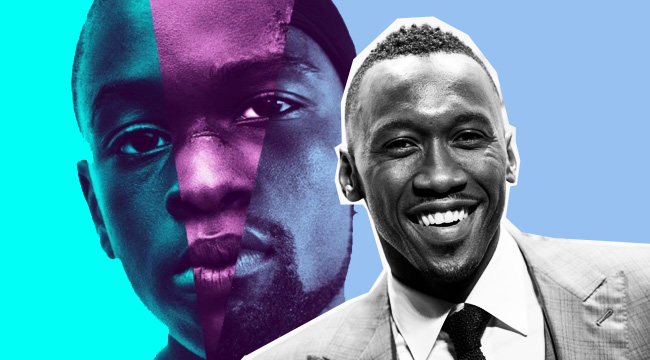
Mahershala Ali is a very popular man right now. And it’s pretty difficult to miss him in a crowd, as he towers over most mere mortals (including myself). On Monday night, Moonlight won a whole host of awards at the Gotham Independent Film Awards*; on Tuesday, during a lunch and panel hosted by Peggy Siegel and A24, Naomie Harris, Ali, and director Barry Jenkins were told in front of the guests that Moonlight had now won another round of awards from the National Board of Review.
*As a side note, on Monday night I attended the Gotham Awards and was sitting at the Everybody Wants Some!! table which was a) as you can probably imagine a total hoot and b) made me feel like Kramer in that episode of Seinfeld when he won a Tony for Scarsdale Surprise. Anyway, I ran into Barry Jenkins later that night after his win for Best Picture and, since I interviewed him a couple of months ago, he’s gone from “cautious” about his film’s awards chances to, maybe, “cautiously optimistic.”
Ali has been acting for the last 15 years and his profile got a boost when he starred as Boggs in the Hunger Games franchise. But 2016 is his year. He’s received much acclaim for his role on Luke Cage and you’ll see him again in the upcoming Hidden Figures, which is a huge crowdpleaser. But what everyone is talking about is his role in Moonlight as a drug dealer named Juan who mentors a young Chiron (played in that chapter by Alex Hibbert). This isn’t what we usually see out of a character with that profession, as Ali plays him as fatherly. (For more on Moonlight, you can read our review from September. It is deserving of all its accolades.)
After the panel, I spoke to Ali about a couple of specific questions I’ve had about his performance in Moonlight, (at least, I spoke to him after he was done getting the glad hand from well-wishers).
You’re very popular right now.
[Laughs.] Yeah.
When I watched Juan my thoughts were, “He’d make a great dad.” Which is not usually what we think of characters with Juan’s profession. Was that portrayal on the page when you got the script, or was that you?
Well, I don’t know if it was on the page. I think the spirit of the character is clearly on the page. But then it becomes your job to put all of the parts together. You come in ready to do the work and discover what’s on the day. The same is true for the director as well – and in this case the co-writer happens to be the director. Usually the director has to take the script and take those actors and, working together, the sum can be greater than the parts. So, I think we all contributed something to lift it off the page.
There’s a scene when Chiron asks Juan what “faggot” means. Juan’s response that it’s a word to make gay people feel bad is so straightforward and still nuanced. That scene could go many ways, how did you approach it?
I think I just had to wrap my brain around those circumstances.
Explaining an ugly word to a child.
What it means to be this person, to be Juan, talking to this young man asking a very specific question. At a time when kinds are having a conversation, maybe about the birds and the bees, and that’s probably a little bit early for that – probably a year or two early for that. So just putting myself in those circumstances and just struggling and wanting to say the right thing.
And it worked.
What I love about Juan, what’s so wonderful about that character, is that he’s really well intending and he has wonderful attributes. And I wanted to honor those, because you always have his occupation working against him in the larger story, right? So I wanted be very conscious of the fatherly and these wonderful attributes he had and lean into those. So it was a real opportunity to explore that.






